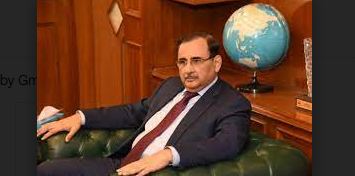Anjum Nisar says decision to worsen economic crisis; multiply production cost
ISLAMABAD: /DNA/ – Shocked by the unprecedented fourth consecutive jump in petroleum product prices the Federation of Pakistan Chambers of Commerce and Industry’s Businessmen Panel (BMP) has said the move would worsen the economic crisis, multiplying cost of production and intensifying miseries for the trade and industry, as the government has raised petrol rate by 8.5 percent for the fortnight of this month.
FPCCI former president and Businessmen Panel (BMP) Chairman Mian Anjum Nisar said that it has become almost impossible to run the industries at such a high cost. This was the fourth consecutive hike in petroleum prices while, in the tenure of the caretaker government alone, the petrol prices have been raised by almost Rs60 per litre, which was going to create a lot of problems for the already ailing economy as the production has been curtailed by many industrial units to a great extent due to high cost.
He said that the trade and industry was already overburdened due to recent increase in electricity tariffs which is aggravated by the extraordinary upsurge in petroleum prices, triggering severe anxiety not only amongst the masses but also the business and industrial community.
He criticized the caretaker government that it should have kept the prices of petroleum unchanged due to the falling landing cost of imported crude on account of the persistent rise in the rupee strength against the dollar in the last eight interbank sessions despite rising crude oil prices in the world market.
The FPCCI former President explained that the rupee closed at 296.85 for a dollar in interbank on Friday, reflecting more than Rs10 to a dollar gain. He recalled that the businessmen had forewarned the authorities several times over the last few months to address the teething problems in the import of the Russian crude, i.e. handling of oil cargoes; adjustments required vis-à-vis refining processes and commercial transactional procedures to settle oil payments. Nevertheless, the authorities failed to listen to them and currently the country would have more Russian crude by now, which is cheaper by a whopping 40pc as compared to international markets today.
It is fact that the given the economic crisis being faced by the country, the government has to take harsh steps to generate the required revenue for overcoming expenditures and fulfilling international commitments. However, instead of taking these steps back-to-back, the government should devise some kind of an effective strategy to ensure some sigh of relief to the masses and the industry who will not be able to bear the brunt caused by consecutive price hikes.
Anjum Nisar stressed that the emerging situation has to be efficiently addressed and handled very carefully otherwise, the rising petroleum prices and electricity tariffs would continue to increase the cost of doing business, which would terribly affect the industrial performance, raise unemployment and open the floodgates of inflation, particularly for the middle and lower segments of the society, besides making the poor poorer due to unbearable inflation.
The unexpected massive increase in petrol and diesel prices was widely felt as inflationary at the retail level and the State Bank of Pakistan may have to review its decision of leaving the key interest rate unchanged. He believed that the inflation would be in the range of 30-31 per cent in the ongoing month which is against the SBP’s expectation to bring it down to 20-22pc.
After keeping its policy rate unchanged at 22 percent by the central bank, the government increased the petroleum prices by over Rs26 per litre making it clear that inflation would be higher in September. In my view, the SBP has already removed inflation projections from the current monetary policy statement, it seems that it is known that the previous inflation projection of 20-22 percent will not be met as global commodity prices are being passed on in the local market, he said. He said if the exchange rate could not be kept under control like being done these days, the inflation could hit as high as 40 percent. Given the better expectation of agriculture output alongside lower than expected current account deficit for August, the SBP kept the interest rate unchanged at 22 percent. The SBP also mentioned that the dollar supply in the open market has increased due to the government’s crackdown against currency hoarders, he said.
Anjum Nisar said that it is feared that the rest of 50 percent industries will also shut down due to the exorbitant energy tariffs, he said, urging the government to bring down petroleum and electricity prices to lower production costs. He said the surging fuel prices will lead to an increase in unemployment and hurt the underprivileged segments of society. High diesel prices will result in higher transportation costs for goods and adversely impact those industries that are too dependent on cargo shipping and freight services, he said. He urged the government to prioritise the implementation of renewable energy initiatives.
He said the country has been living beyond its means while relying on handouts and debt to fund imports, high government expenditure, mounting losses of state-owned enterprises and distribution losses in the energy sector.












